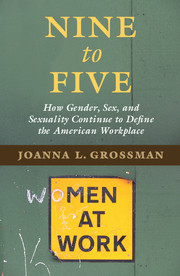Book contents
- Frontmatter
- Dedication
- Contents
- Foreword
- Acknowledgments
- Introduction
- PART I WHAT IS SEX DISCRIMINATION?
- PART II SEXUAL HARASSMENT
- PART III PREGNANT WOMEN AND MOTHERS AT WORK
- PART IV FEMALE BREADWINNERS AND THE GLASS CEILING
- 47 The Supreme Court Slams the Door on Pay Discrimination Claims
- 48 A Call for Congressional Action to Remedy Pay Inequality
- 49 The Lilly Ledbetter Fair Pay Act of 2009
- 50 Taking Stock: Is the Ledbetter Act Working?
- 51 The Lady in Red
- 52 Unfinished Business
- 53 Will ABA's Proposed Solutions for Gender Inequity Work?
- 54 Equality Still Elusive for Women in the Federal Workforce
- 55 “Girlie Men”
- 56 Playing “Too Womany” and the Problem of Masculinity in Sport
- 57 Binders for Women, Blinders for Romney
- Conclusion
- Notes
- Index
52 - Unfinished Business
from PART IV - FEMALE BREADWINNERS AND THE GLASS CEILING
Published online by Cambridge University Press: 05 May 2016
- Frontmatter
- Dedication
- Contents
- Foreword
- Acknowledgments
- Introduction
- PART I WHAT IS SEX DISCRIMINATION?
- PART II SEXUAL HARASSMENT
- PART III PREGNANT WOMEN AND MOTHERS AT WORK
- PART IV FEMALE BREADWINNERS AND THE GLASS CEILING
- 47 The Supreme Court Slams the Door on Pay Discrimination Claims
- 48 A Call for Congressional Action to Remedy Pay Inequality
- 49 The Lilly Ledbetter Fair Pay Act of 2009
- 50 Taking Stock: Is the Ledbetter Act Working?
- 51 The Lady in Red
- 52 Unfinished Business
- 53 Will ABA's Proposed Solutions for Gender Inequity Work?
- 54 Equality Still Elusive for Women in the Federal Workforce
- 55 “Girlie Men”
- 56 Playing “Too Womany” and the Problem of Masculinity in Sport
- 57 Binders for Women, Blinders for Romney
- Conclusion
- Notes
- Index
Summary
A flurry of recent events invites consideration of why gender still matters. To some, this may be surprising: if we are in what some call a post-identity age, in which one's sex, race, or ethnicity does not – or should not – matter, then why still speak about gender? Talking about gender is important for at least one fundamental reason: there is still a gap between ideals of sex equality and of equal citizenship and the reality of many women's lives. Growing attention to the persistence of gender inequality – both in the United States and globally – provides a perfect moment for addressing, and working to close, that gap.
THE OBAMA PRESIDENCY: A MOVE BEYOND IDENTITY POLITICS?
When Barack Obama was elected in November 2008, after winning a hard-fought battle with Hillary Clinton in the Democratic primary, many were ready to proclaim our arrival at a post-race society. As William Bennett remarked in election night media coverage, “I hope it closes a chapter in American history. The great stain. Obviously you don't change American history. The notion that some people say, well, if you're born black in this country there's just things you're limited from doing, this is the biggest job of all. Think of what you can say to children now. Every child of every race.”
Hillary Clinton's near-success in obtaining the Democratic primary nomination and the choice of then-governor Sarah Palin as the vice presidential candidate on the Republican ticket also speak to the state of gender in our society, but, here, the message may be more complicated. Clinton's bid for the nomination, while ultimately unsuccessful, reenergized feminists and caused many people to grapple with the role of gender in politics and as an aspect of leadership. The battle between Clinton and Obama for women's votes reopened debates about essentialism, and revealed not only a generational divide among women but also divides on the basis of other, often complicated, identity categories.
Trying to explain the disappointment, and even anger, that some women felt – and the resulting threats to vote for John McCain that some reportedly made – when Clinton lost to Obama, Susan Faludi wrote of “second place citizens” and the frustration that, eighty-eight years after women's suffrage advocates secured the right to vote, women still hit the glass ceiling in reaching the highest political office.
- Type
- Chapter
- Information
- Nine to FiveHow Gender, Sex, and Sexuality Continue to Define the American Workplace, pp. 304 - 308Publisher: Cambridge University PressPrint publication year: 2016



